
by CHARLOTTE JONES
Directed by John Vreeke
AMERICAN PREMIERE
Featuring Woolly
company members Kimberly Gilbert & Sarah Marshall with Tiffany Fillmore, Beth
Hylton, David Bryan Jackson & Tony Nam
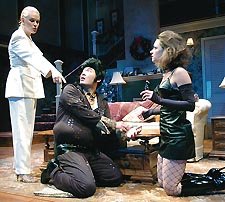
"Vreeke's ANTIC staging brings out the weirdness [in] the CRACKPOT
characters…a FIRST-RATE CAST" - City
Paper
"RELENTLESSLY FUNNY…brisk,
convincingly performed & wholly absorbing"- Express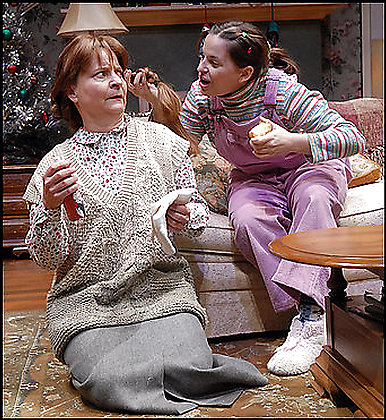
<>
"A comedy with equal parts absurdity and
tenderness. JUICY CHARACTERS PULLED STRAIGHT FROM A JERRY
SPRINGER SCRIPT…hearty laughs …honest emotions, honest wisdom"
- Washingtonian
"Woolly Mammoth remains the most cutting edge theatre in
town" - OnTap
"A LIVELY COMEDY. Outlandish" - Washington
Post
"The best damn Christmas show ever! The cast is SUPERB"
- DC Theatre Reviews
"STRANGE AND BRILLIANT…SPECTACULAR. The cast is
wonderful. Sarah Marshall [is] a sheer delight to watch" - MetroWeekly
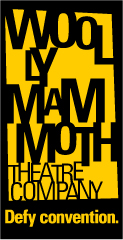 ABOUT THE SHOW:
ABOUT THE SHOW: From
the internationally acclaimed author of
Humble Boy comes an
eccentric and hilarious collection of Bolton, England misfits. Josie, a
dominatrix who feels ready
to hang it all up, is dreading her 40th birthday - so her favorite
client Lionel throws a party with a special musical guest! But the
real surprise comes when a ghost from the past barges in, propelling
this outrageous mix of edgy comedy, heart-throbbing humanity, and
sheer ridiculousness - about the sort of love that gets you all shook
up.
RUNNING TIME: Approx. 2 hours, 20 min.
From Artistic Director, Howard Shalwitz:
"What a quirky, original, and endearing play this is! Charlotte Jones
has created a memorable collection of eccentric characters -- a
dominatrix, an obsessive compulsive, a Chinese Elvis impersonator,
and more -- but she has the empathy and sense of detail to make
them totally human," said Artistic Director Howard Shalwitz. "The
play is hilariously funny, but what comes through, above all, is
its sense of compassion for people of all kinds, and its belief in
their potential. Woolly Mammoth is thrilled and honored to be launching
this unique holiday treat to American audiences."

At Woolly, Odd Birds Of a Feather
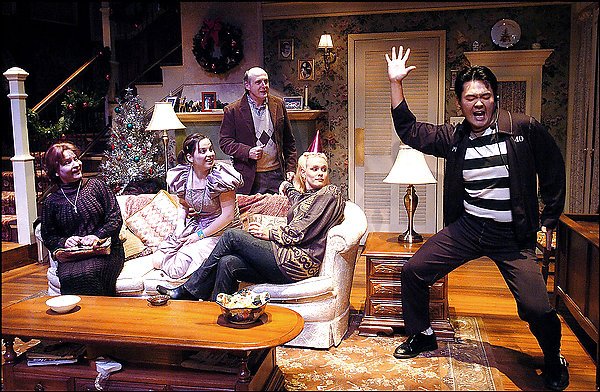
British Playwright Offers a Character Study
By Jane Horwitz
Special to
The Washington Post
Wednesday, November 8, 2006; Page D05
They would make for an unusual guest list, the
characters in British playwright Charlotte Jones's 1999 comedy,
"Martha, Josie and the Chinese Elvis": Josie, a prostitute-dominatrix;
Brenda-Marie, Josie's mentally challenged adult daughter; Timothy Wong,
a gay, Vietnamese English Elvis impersonator; and Martha, an
obsessive-compulsive housecleaner. The play, now in previews, opens
Sunday at Woolly Mammoth Theatre Company and runs through Dec. 10.
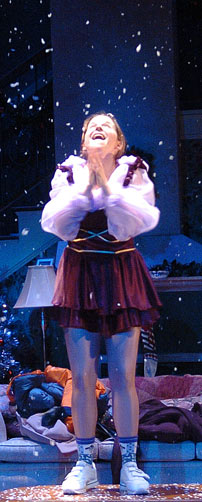
"I knew I wanted to
have an Elvis impersonator and a dominatrix,"
Jones e-mails from London. "But I wanted to see the domestic world of
the dominatrix -- so Brenda-Marie was born. I never thought of the
characters
as dysfunctional -- or at least I was always interested in what lay
beneath
the dysfunction. I did want to write a comedy, yes, but a comedy with
heart."
She mentions that one theatergoer said she "started off thinking,
'Who are these collection of weirdos? I wouldn't want to sit next to
them
on a train,' but she ended up by thinking, 'I want to invite them all
to
my house for Christmas dinner.' I have treasured that remark."
Jones, who has been in rehearsals in London for her new show, "The
Lightning Play," which opens tomorrow at the Almeida Theatre, says she
can't help mining family foibles for dramatic fuel. "Sometimes I think
a
writer has no control over their subject matter -- you write to scratch
an itch, to get something out of your head -- and I think I, for my
sins, write about parents and children."
John Vreeke, who is staging "Chinese Elvis," recognizes the pitfalls of
a piece wearing its heart on its sleeve -- an unusual choice for
Woolly, which leans toward comedies spiked with apocalyptic tragedy. To
avoid what he calls the "over-saccharine," Vreeke says, the lines of
the play must
be plumbed "to find a kind of psychological reality and truthfulness
for
each of the characters. . . . If you can find that and anchor all of
the
comedic lines within that, then you'll avoid it being overly cute or
sweet
or sugary."
Jones, 38, wrote the script for Andrew Lloyd Webber's recent musical
"The Woman in White," but is best-known for her much-awarded play
"Humble Boy." A London hit in 2001-02, it ran in New York in 2003 and
here at Washington Stage Guild in 2005. A modern riff on "Hamlet,"
"Humble Boy" is about
a nerdy physicist, home for his father's funeral, who learns his mother
had a longtime lover.
In "Martha, Josie and the Chinese Elvis," the family nearly implodes as
unexpected arrivals and revelations salt old wounds. Yet it ends on a
redemptive note. "This play is set on the Feast of Epiphany, and I
wanted all the characters to have some sort of epiphany," Jones writes.
"I think there is hope for them all. This is my most joyful play, I
would say."
Woolly is having a come-dressed-like-Elvis performance Saturday at 8
p.m. Those who take the challenge will get discounted tickets.
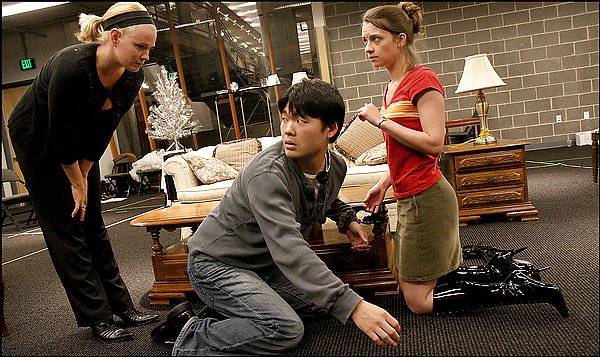
How to Impersonate an Elvis Impersonator
By Lisa Traiger
Special to
The Washington Post
Friday, November 3, 2006; Page WE22
When Tony Nam first read for the role of
Chinese Elvis, he was worried. "I was concerned it would be this very
stereotypical, not socially acclimated character who was awkward and
spoke in broken pidgin
English," the Silver Spring-born actor admits. The last thing he wanted
was to end up playing broad and loose with Asian stereotypes. Frankly,
he
had no desire to wind up a poor man's William Hung, the awkward
third-season "American Idol" loser who became a household name with his
improbably bad rendition of Ricky Martin's "She Bangs" and the equally
improbable release of three CDs.
But Nam got the part of Timothy Wong, an Elvis Presley impersonator in
working-class England, and currently headlines at Woolly Mammoth
Theatre Company in "Martha, Josie and the Chinese Elvis." Odd as it
might sound, it's a surprisingly compassionate comedy about an
eccentric collection of misfits -- a dominatrix, an
obsessive-compulsive and, of course, a slightly bad Chinese Elvis
impersonator.
Of Wong, director John Vreeke says, "he's in search of himself and is
feeling unaccepted because of who he is. Somehow, by his performance as
an Elvis Presley impersonator, he finds something of himself."
As an actor of Korean descent, Nam could never have dreamed he'd find
himself in Elvis, and with a British accent to boot. Yet there he was
in a basement dressing room refining his takes on such classics as
"Heartbreak Hotel" and "Always on My Mind," not to mention that
trademark hair flick and the mumbled "thank you very much." In fact,
Nam, whose family emigrated from South Korea in 1977 (the year Presley
died), admits that his knowledge of the King came almost entirely from
watered-down Elvis impersonators
he watched on television.
"My vision of him was that he was kind of cheesy," Nam says. That
is, until this summer when he put himself through an Elvis immersion
program of his own devising, watching most of the classic Presley
movies and studying concert footage of the real Elvis, along with
videos of those who have
made careers impersonating him. "I was just blown away by how
charismatic
he was," Nam says. "He was an incredible performer. A real artist. What
he did onstage was so deep and really came from a soulful place. It was
a revelation to see that, and that . . . allowed me to go after
something
that was a little more respectful of what he did."
As a theater graduate student at the University of Washington in
Seattle, Nam was cast in every type of role because the program's
director wanted all the students to gain practical experience. "Now
being out of school and trying to get work in the professional world,"
Nam says, "I do find there are limitations." Each season he carefully
scans the local audition notices, trying to discern whether there might
be parts for an Asian American actor. "In this area I have been called
in for parts that aren't necessarily Asian, too," he allows, but says
those opportunities are rare.
That's why he has taken such a liking to his role as Chinese Elvis.
"From an actor's point of view," he says, "it's nice to play a
character that's written Asian but is a second-generation Asian and
much more socially aware. [Playwright] Charlotte Jones has taken a lot
of care to make this character three-dimensional, really human. That
Timothy's Asian is a small part of who he is; he just happens to have
been born in a different country."

November 17, 2006
Return of the Kink
By Bob Mondello
Everything old is new again, and for situational
comedy that goes double. When Kaufman and Hart introduced audiences to
their xylophone-playing, ballet-dancing, tax-evading, dart-throwing,
basement-firework-making Sycamore clan in You Can’t Take It With You
some 70 years ago, their farcical model was Plautus—by way of
Shakespeare.
Today, when Brit playwright Charlotte Jones mines
comic eccentricity to animate the Butting family of Martha, Josie and
the Chinese Elvis, the influences range from Kaufman and Hart to
Michael Frayn, with just a touch of Joe Orton thrown in. The
domesticity is still warm, though the character-based laughs are a tad
racier: It says something when a dominatrix is the most unremarkable
creature on stage.
That would be Josie, a down-to-earth,
family-oriented sex worker who sends her learning-challenged but
imaginative daughter, Brenda-Marie, out to play in a backyard tent
whenever a client requests a bit of discipline with his tea. When she’s
not cracking a whip, Josie’s a sweetly devoted
mom, and her home is inviting, warm, and absolutely immaculate, which
doesn’t stop her obsessive-compulsive housecleaner, Martha, from
polishing surfaces constantly.
“Look at this mess,” says Martha, gazing around
the pristine living room. And once she has knocked five times, turned
the doorknob
five times, taken five steps, and distributed five towels, she’s ready
to begin eliminating all manner of imaginary dust.
Today, as it happens, there will be more dust
kicked up than usual, because one of Josie’s clients, an amiable,
cross-dressing dry cleaner named Lionel, is throwing her a 40th
birthday party. He’s mixed up a big pitcher of Catastrophes (a
blue-green libation that looks about as lethal as its name), and to
entertain he’s hired an Asian Elvis impersonator who’s brought his own
smoke-machine, as well as a few changes of costume (deft
work by Kate Turner-Walker, who also supplies the leather ’n’ lace
discipline
wear) so he can burst upon the scene as a svelte, studly hip-swiveler
and
morph into a flabby, rhinestone-encrusted King. This Elvis has come
prepared, in short, for most eventualities and is flexible enough to
continue smiling gamely even when a command performance of “The Wonder
of You” requires
him to croon while handcuffed to the coffee table.
Also on hand by the time he’s cuffed is
Brenda-Marie’s twin sister Shelley-Louise, who more or less upends the
festivities by returning from the dead (or at any rate, from
self-imposed exile) as a birthday
surprise for her mother. Since mom long ago convinced Brenda-Marie that
her twin had died, this creates a domestic disconnect, and a few tears
later,
with Elvis acting as family counselorÉoh, you get the drift.
Now, apart from the fur-lined handcuffs and the
cracking of the occasional whip, most of this would not have been
terribly out of place
in the sort of family comedy that thrived on Broadway in the ’30s. So
what,
you may ask, is Martha, Josie and the Chinese Elvis doing at Woolly
Mammoth,
D.C.’s house of the avant-garde? Truth be told, it’s not a perfect fit.
The
play’s sweetly insubstantial and hasn’t got the edgy eccentricity
audiences
have come to expect from this adventurous troupe. But if Jones’
just-be-yourself
message is conventional, the crackpot characters are right up Woolly’s
alley,
and John Vreeke’s antic staging brings out the weirdness in the
first-rate
cast that embodies them.
Start with Sarah Marshall’s compulsive Irish
housekeeper whose obsession with the number five is so persuasive that
you half expect her to take that number of curtain calls at evening’s
end. Counting softly to herself, she roams the stage scouring tables
with her gaze, unnerved by dust, appalled at fingerprints, frantic
about dirt-based infelicities of every stripe. Marshall’s eyes are
among the most expressive instruments on a Washington stage, and when
she sets them to vibrating after an unexpected compliment, she’s a
flat-out riot. Leave this woman on an empty stage with a pitcher of
Catastrophes, and you hardly need a playwright.
Kimberly Gilbert, meanwhile, is making
Brenda-Marie the brightest dim bulb around. With restless fingers ever
in motion and a fiercely engaged way of looking at the world
(especially when racing around
the room as a figure-skater-in-training), she seems less learning
disabled
than a gifted literalist. Told that someone has “skullduggery written
across
his face,” she makes puzzlement seem the only reasonable reaction. It’s
easy to see why Tony Nam’s athletically gyrating, deep-voiced,
comically Chinese
Elvis might describe her as possessing an “ageless wisdom” before
joining
her in her tent to escape the escalating madness.
David Bryan Jackson, downright fetching in his
fishnet stockings and frilly black-velvet French maid outfit, is
likewise pretty out there. And if Beth Hylton’s whip-cracking
dominatrix and Tiffany Fillmore’s wounded prodigal daughter seem more
conventional, well, the playwright imagined
them that way so there’d be some ballast when the going gets
sentimental.
The Woollies have given the show’s American
premiere a solid, two-story Tudor home that grounds the proceedings
persuasively in the real world. Dan Conway’s chintz-wallpapered setting
could do double duty for a Noises Off revival without so much as a
shifted sofa. And sturdy as it looks, its walls turn effortlessly
transparent at evening’s end, when Colin K. Bills looses a few nifty
lighting effects to create a starry, Christmas-evoking snowstorm—which
seems a fitting conclusion for a cheery little trifle that stands a
decent chance of running right through the holidays. CP
A CurtainUp
DC  Review
Review
Martha, Josie and the Chinese Elvis
by Rich See
Woolly Mammoth has unveiled a humorous
Christmas show for everyone who feels the pain of "Home for the
Holidays." The company's American premiere of Charlotte Jones' Martha,
Josie and the Chinese Elvis is lighthearted fluff that's witty, fun
and will entertain even the biggest Scrooge.
Set in Bolton, England on the Feast of the Epiphany (January 6th), Ms.
Jones sets her story in the home of Josie, a professional dominatrix
and single mother of two grown daughters who is on the cusp of turning
forty. While one of her daughters (Shelley-Louise) is presumed dead,
the
other (Brenda-Marie) is mentally challenged, living at home and
dreaming of being an ice dancer. Into their world comes Martha their
OCD suffering housekeeper, who refuses to acknowledge the number six.
Martha, who is unaware of Josie's occupation, counts to five repeatedly
to ward off the Devil's temptations or when she is angry, nervous or
confused -- which tend to be most of the time.
When Lionel, a client of Josie's who likes to dress as a French
maid and be whipped for being a "naughty girl," discovers that Josie is
retiring, he sets out to throw her a birthday party and promises a
special
surprise guest. Timothy Wong it turns out is an Elvis impersonator who
is just starting out and doesn't know all the words to The King's
songs. But he has heart and a trunk full of costumes, so Lionel hires
him to
stay for the duration of the party.
This birthday looks like a train wreck as Lionel pushes high-octane
"Catastrophes" on everyone and Timothy does his best to sing in tune,
but the collision really happens when the long dead Shelley-Louise
arrives with her suitcase in hand and a chip on her shoulder. So ends
Act One and Act Two picks up as Shelley-Louise and Josie sort out their
differences, Lionel chases Martha, Brenda-Marie sits in her tent hoping
for snow and Timothy Wong keeps changing costumes so someone will
listen to him sing.
Director John Vreeke handles the subject material well in a screwball
comedy that is short on plot and long on wacky characters. The two and
a half hours flow by quickly and the only lag in timing is during Act
Two, which Ms. Jones could shorten just a bit to tighten the material
and keep things focused. Other than that, this production is pure
Woolly
-- zany characters, a dead corpse (in this case the corpse has come
back
for more), odd adult themes and a wacky ending to the entire affair.
It's what the company does best and this is a great show for its season
line up.
Dan Conway's set is a stately two story, English Tudor home with a
hidden closet of leather fetish tools and an elaborate backdrop
depicting an English townscape. Kate Turner-Walker's costumes --
especially the Elvis attire -- are on the mark and it looks like she
had fun in outfitting the cast. Colin K. Bills' lighting has some very
nice, holidayesque moments -- especially between the scene changes. And
Matt Neilson keeps Elvis in the air with snippets of Presley hits
throughout the show.
In the cast, Sarah Marshall is wonderful as the obsessive compulsive
Martha. Her counting to five is funny, but in a way that brings
sympathy for her and anyone who suffers from OCD. She walks a fine line
between making Martha a caricature and a real person and succeeds in
bringing out the eccentric humor in the housekeeper while maintaining
the character's humanity.
Kimberly Gilbert achieves a similar feat with Brenda-Marie, bringing
the young woman's vulnerabilities to the front and becoming the truth
speaker in a home where no one is talking. When the ice dancing finally
rises up within her you want to shout with glee.
Beth Hylton's Josie is a woman on the verge of middle age who is ready
to give up her whips, chains and handcuffs for something else. What
that something is, she is unsure, but she knows her days as a
successful dominatrix are numbered and she would like to go out while
she is still on top, so to speak. Meanwhile, Tiffany Fillmore's
Shelley-Louise is
a mix of anger and fear, insisting she is a grown woman, but acting at
times like a little girl.
David Bryan Jackson brings Lionel into humorous life with a nonchalant
attitude that moves well from French maid attire to more conventional
clothing. Mr. Jackson pulls out Lionel's inner loneliness so that when
the dry cleaner falls for Martha so quickly, the audience can accept
the sudden turn of events between such different characters.
And Tony Nam creates an Elvis singing, rhinestone wearing Timothy Wong
with whom you empathize. Handcuffed, whipped and heckled by his
audience he keeps coming back for more in an attempt to win them over
and when they don't respond -- he hides in a tent.
Martha, Josie and the Chinese Elvis is a fun treat which
ends on a magical note that pokes gentle fun at itself and makes you
laugh at our universal desire to have a Christmas miracle.

WASHINGTONIAN
Martha, Josie, and the Chinese Elvis
Reviewed by Chad Lorenz
A comedy with equal parts absurdity and
tenderness, is at Woolly Mammoth Theatre Company
Restraint can be a talent. When you have a play
about an aging dominatrix and her mentally disabled daughter and you
add in a cross-dressing client, an obsessive-compulsive Catholic
housekeeper, and an Asian Elvis impersonator, a playwright might be
tempted to let things careen into chaotic absurdity. Not
Charlotte Jones.
In Martha, Josie, and the Chinese Elvis, juicy characters
pulled straight from a Jerry Springer script thinly mask a tender
family
story, rife with clever metaphors and hearty laughs. It’s a credit to
Jones’s
writing that it all comes together smartly and evenly.
On her 40th birthday, also the day of Epiphany, Josie has become tired
of being a professional madame. Her life in England has become one of
domestic comfort—you’d barely know she was in the sex biz. Her twenty
-something daughter, Brenda-Marie, is sweet and loving and, by her own
admission, “too simple.” She lives in an imaginary winter fantasyland
where
she yearns for snow and gives sports commentary on imagined ice-dancing
competitions.
Longtime client Lionel is willing to forgo a spanking and set aside his
petticoats for an evening so he can cheer Josie up by throwing her a
birthday party. It also gives him a chance to make his move on the
high-strung maid, Martha, who in her obsessive-compulsive behavior does
everything in
sets of five: turning doorknobs, walking up steps, dusting, and making
the
Sign of the cross.
One surprise of the evening—an Elvis act—turns out to be a ridiculous
delight for the party; another, more personal surprise doesn’t go over
as well, especially for Josie.
The rest of the well-paced play is spent fitting together these oddly
shaped puzzle pieces of people into a complete picture. Before long the
characters endear themselves to the audience.
All the while, secrets are revealed, metaphors pop, and revelations
erupt. The use of Elvis, for instance, is more than a cute gag; there’s
a surprising larger message about the mythology that lives on after
death, and the running soundtrack of the King’s songs is particularly
apt.
While Jones has penned the smart plot and dialogue that makes the
characters work, director John Vreeke and his cast also deserve credit
for animating them so well. Kimberly Gilbert skillfully balances the
comedy of her role as the mentally challenged Brenda-Marie with a
sensitivity that avoids
the condescending stereotype; she proves to have the most enlightened
perspective at all. Tony Nam plays Elvis impersonator Timothy Wong with
charm and
has the hip and vocal acrobatics down. The always-funny Sarah Marshall
is a hilarious Martha, but her fumbling with an Irish accent distracts
from most of her lines.
As Josie, Beth Hylton is the strong, nurturing mother with a hidden
vulnerability. She was convincing as such except in the one scene where
it counted most: Her attempt to reconcile with her past felt rushed and
lacked the tenderness the moment called for.
Where Chinese Elvis succeeds most is in its honesty—honest
emotions, honest wisdom, and honest laughs. All three culminate in the
play’s
satisfying ending, a funny, heartwarming scene capped with a little
magic.
Just right for the holidays.
17. Nov 2006

Holiday Trip
Woolly Mammoth takes on the holiday season with a strange and
brilliant 'Martha, Josie and the Chinese Elvis'
by Tom Avila
Published on 11/16/2006
Ah, the holidays, a time when all the old
theatrical chestnuts come out. There's The Nutcracker and A
Christmas Carol. And don't forget this other tale as old as time,
set on The Feast of the Epiphany:
Dominatrix/mother of a mentally challenged adult
daughter turns 40 and begins to doubt her chosen profession. Client of
the dominatrix/single mum, a suburban dry cleaner with a fondness for
being humiliated while
wearing women's clothing, throws a party where the guest list includes
the birthday girl's ultra-religious housecleaner and a Chinese Elvis
impersonator-in-training. Oh, and the housekeeper suffers from a severe
obsessive-compulsive disorder that causes her to count to five when
anxious. And the daughter dreams
of becoming a world-famous ice dancer. And the Chinese Elvis is
actually
Vietnamese. And gay.
And there's a tent. And snow. And an aptly named
lime green drink called ''A Catastrophe.''
Okay, so it's not actually a well-worn holiday
chestnut, but with its production of Charlotte Jones' Martha, Josie
and the Chinese Elvis Woolly Mammoth Theatre Company has turned the
holiday show on its head to spectacular results. From its jewel box of
a set to a cast that shines brighter than the silver tinsel tree in the
center of the stage, Woolly
has taken full advantage of this strange but brilliant play.
While there is an urge to rush forward and give
proper praise and applause to the actors, full ovations must be given
to playwright Charlotte Jones. Best known for her award-winning play Humble
Boy (2001), Jones also wrote the book for The Woman in White
(2004), an
Andrew Lloyd Webber musical. A deft writer with the ability to take an
audience
from flat-out humor to genuinely heartfelt sadness, Jones offers an
original and compelling voice. After all, it's not every show that ends
a bitter
mother-daughter battle with a line like, ''I'm sorry Elvis. This has
nothing
to do with you.''
Everyone in Director John Vreeke's cast is
wonderful to watch on stage, although there is occasionally a desire to
feel that some are in better control of their character.
Sarah Marshall plays Martha, the housekeeper,
with a
dryness and restraint that makes her a sheer delight to watch. Marshall
has a keen sense of her audience and knows when to play a gag a bit
longer or reel it in short. One is tempted to refer to her as a great
comedienne but that would dismiss some of the lovely dramatic turns she
takes during the show. In the end, Marshall is simply a great actor.
Martha, Josie and the Chinese Elvis
To Dec. 10
Woolly Mammoth
Theatre Company
641 D St. NW
|
Beth Hylton, as dominatrix Josie, appears to be
having a great deal of fun in her performance, which would seem to be
an easy task
when one is playing a dominatrix suffering her way through a midlife
crisis.
Kimberly Gilbert is Josie's daughter Brenda Marie, who dreams of ice
dancing
for Canada (despite the fact that she lives in England). Here again is
an
instance where an actor's ability is seriously tested and absolutely
proven.
It would be easy for Gilbert to play Brenda Marie's disability for
quick
laughter. But Gilbert takes great care with her performance. The
audience most definitely laughs with the young woman and not at her.
Tony Nam's Chinese Elvis is a marvelously written
character whose true heart is sometimes lost beneath the sight gags.
And David Bryan Jackson's Lionel wobbles a bit between being lonely and
sweet, which appears to be Jones's intention, to coming off a bit
lecherous and frightening. None,
however, should feel anything but pride in their performances.
It is highly unlikely that Martha, Josie and
the Chinese Elvis will become an annual holiday fixture. All the
more reason
to take advantage of this gift D.C. theater audiences have been offered
by the people at Woolly Mammoth.
The GW Hatchet
George Washington University
Independent Student Newspaper
Christmas Cheer and an Elvis Impersonator
by Rachel Baird
Hatchet Reporter
Issue date: 11/20/06 Section:
Arts
I'm
still looking at Halloween pictures on Facebook, Thanksgiving
hasn't hit, yet Christmas is already everywhere. If "Jingle
Bells"-themed Old Navy commercials aren't enough to
put you in the holiday spirit, consider seeing Woolly Mammoth Theater's
production
"Martha, Josie, and the Chinese Elvis" directed by John Vreeke. This
show
will certainly put you in the mood for the oncoming season of snow and
heartwarming.
The play is definitely a comedy, but it also makes time for sentimental
and joyous moments that are customary in a traditional Christmas piece.
Similar to Scrooge in Dickens' classic "A Christmas Carol," all the
characters have a moment of clarity when they realize, with the love of
others, they can lead more fulfilled lives.
The program tells us that the play takes place on January 6, but it
appears to be Christmas-time because the family has refused to take
down their tree and decorations. The play occurs more or less in
real-time
as the audience observes the dramatic episodes during the mother's
birthday party. She begrudgingly tolerates the celebration after she
has decided that, at age forty, she is too old to have fun. The guests'
personalities collide on stage, which creates a lot of entertaining
drama.
Watching the completely eccentric cast is where the comic elements of
the play lie. The ensemble includes the matron who is a dominatrix, her
daughter who is feeble-minded, the drycleaner man who cross-dresses, a
devout
Catholic with OCD, and a Vietnamese gay guy who is a struggling Elvis
impersonator. Of course, there is one "normal" character, but she is
the estranged we-thought-she-was-dead daughter who has commitment
issues. Having so many characters compete for who has the most
outrageous complex does weigh down the play. The middle of the play
tends to drag because each character must experience an epiphany before
the finale, so there is a period of tedious lull.
Despite any preachy tones, the actors remain fun to watch because
everyone has perfected his or her role. As the actors move through
their
lines, they successfully portray believable, yet vulnerable,
characters.
Everyone is on a journey for the enlightened moment, and since the
audience
moves on that journey with them, we too achieve a profound sense of
compassion.
"Martha, Josie, and the Chinese Elvis" is a play that was originally
written for a theater in Bolton, England, and this production marks its
premiere in the United States. Much of the humor is what one expects
from a contemporary British comedy, because there is not a lot of
action, but the audience enjoys watching the characters fumble around
the stage mocking each other. Some of the jokes, however, do not
translate because the references are lost on an American audience.
Until one character began to twirl around on stage, I didn't know that
"ice dancing" is the British equivalent to "figure skating." Also, I
didn't realize the play was set in England until I consulted the
program: based on the actors' poor and varied accents, the play could
have taken place in Ireland, Scotland, England, or America. The
character portrayals were tremendous, but their accents were laughable.
Ignoring the accents, "Martha, Josie, and the Chinese Elvis" is
wonderful and memorable because of its wit and dialogue, which will
make you want to cheer. The beverage all the characters pour down their
throats is aptly called the Catastrophe. We watch the actors consume
enough alcohol to understand their crazed reception of the ensuing
fiasco of the numerous relationship and identity problems.
Ultimately, the endearing moments win over, and the characters'
constant anticipation of snow throughout the play complements the
warmth they eventually find in each other's company. I wouldn't want to
give too much away, but the play concludes in true Christmas fashion.
You will certainly be enchanted when, both metaphorically and
literally, the play finishes with a grand, delightful snowfall.

by Charlotte Jones
Directed by John Vreeke
with Sarah Marshall, Kimberly Gilbert, David Bryan Jackson, Beth
Hylton, Tiffany Fillmore and Tony Nam
Set Design: Dan Conway
Lighting Design: Colin K. Bills
Sound Design: Matt Neilson
Costume Design: Kate Turner-Walker
Properties Master: Jennifer Sheetz
Dialect Coach: Jennifer Mendenhall
Woolly Mammoth Theatre Company, 641 D Street NW

 ABOUT THE SHOW: From
the internationally acclaimed author of Humble Boy comes an
eccentric and hilarious collection of Bolton, England misfits. Josie, a
dominatrix who feels ready
to hang it all up, is dreading her 40th birthday - so her favorite
client Lionel throws a party with a special musical guest! But the
real surprise comes when a ghost from the past barges in, propelling
this outrageous mix of edgy comedy, heart-throbbing humanity, and
sheer ridiculousness - about the sort of love that gets you all shook
up. RUNNING TIME: Approx. 2 hours, 20 min.
ABOUT THE SHOW: From
the internationally acclaimed author of Humble Boy comes an
eccentric and hilarious collection of Bolton, England misfits. Josie, a
dominatrix who feels ready
to hang it all up, is dreading her 40th birthday - so her favorite
client Lionel throws a party with a special musical guest! But the
real surprise comes when a ghost from the past barges in, propelling
this outrageous mix of edgy comedy, heart-throbbing humanity, and
sheer ridiculousness - about the sort of love that gets you all shook
up. RUNNING TIME: Approx. 2 hours, 20 min.
 "I knew I wanted to
have an Elvis impersonator and a dominatrix,"
Jones e-mails from London. "But I wanted to see the domestic world of
the dominatrix -- so Brenda-Marie was born. I never thought of the
characters
as dysfunctional -- or at least I was always interested in what lay
beneath
the dysfunction. I did want to write a comedy, yes, but a comedy with
heart."
"I knew I wanted to
have an Elvis impersonator and a dominatrix,"
Jones e-mails from London. "But I wanted to see the domestic world of
the dominatrix -- so Brenda-Marie was born. I never thought of the
characters
as dysfunctional -- or at least I was always interested in what lay
beneath
the dysfunction. I did want to write a comedy, yes, but a comedy with
heart."





